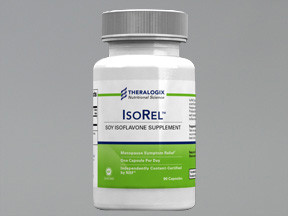SOY (GLYCINE SOYA) - ORAL
PHONETIC PRONUNCIATION:
GENERIC NAME(S): soy isoflavone
Uses
USES: Soy has been used to treat certain symptoms of menopause (such as hot flashes) and to help prevent bone loss (osteoporosis). Some supplement products have been found to contain possibly harmful impurities/additives. Check with your pharmacist for more details about the brand you use. The FDA has not reviewed this product for safety or effectiveness. Consult your doctor or pharmacist for more details.
How to use SOY (GLYCINE SOYA) - ORAL
HOW TO USE: Take this product by mouth as directed. Follow all directions on the product package, or take as directed by your doctor. If you are uncertain about any of the information, ask your doctor or pharmacist. If your condition persists or worsens, or if you think you may have a serious medical problem, get medical help right away.
Side Effects
Precautions
Interactions
Overdose
Images
Reviews
Faq for SOY (GLYCINE SOYA) - ORAL
Soy is commonly used as a dietary supplement and alternative medicine for various health conditions, including menopausal symptoms, osteoporosis, high cholesterol, and certain types of cancer.
Soy contains isoflavones, which are compounds that have estrogen-like effects in the body. These isoflavones may help in relieving menopausal symptoms, reducing the risk of heart disease, improving bone health, and providing antioxidant and anti-inflammatory benefits.
Some common side effects of soy consumption include digestive issues like bloating and gas, allergic reactions in sensitive individuals, and potential interference with certain medications or hormones. It may also affect thyroid function in some people.
In general, soy is considered safe for most individuals when consumed in moderate amounts as a part of a balanced diet. However, individuals with certain health conditions or those taking specific medications should consult with their healthcare provider before incorporating soy into their diet.
Soy contains compounds called phytoestrogens that could potentially interact with hormone levels, particularly estrogen. However, research findings in this area are conflicting, and the effects may vary depending on an individual's health status and consumption levels.
The relationship between soy consumption and breast cancer risk is complex. While some studies suggest that moderate soy intake may lower the risk of breast cancer, excessive consumption or use of soy supplements may have the opposite effect. It is advisable to discuss individual risk factors with a healthcare professional.
Soy may aid in weight loss as it is a high-protein, nutritious food that can help in promoting satiety and reducing overall calorie intake. However, individual results may vary, and incorporating soy into a well-balanced diet and regular exercise regimen is crucial for successful weight management.
Soy can potentially interact with certain medications, including thyroid medications, hormone replacement therapy, and drugs metabolized by specific liver enzymes. It is recommended to inform your healthcare provider about any soy consumption if you are taking such medications.
Soy allergies are not uncommon, especially in individuals with other food allergies. Allergic reactions to soy can range from mild symptoms like hives and itching to severe reactions like difficulty breathing and anaphylaxis. Those with a known soy allergy should avoid soy products completely.
Disclaimer
IMPORTANT: HOW TO USE THIS INFORMATION: This is a summary and does NOT have all possible information about this product. This information does not assure that this product is safe, effective, or appropriate for you. This information is not individual medical advice and does not substitute for the advice of your health care professional. Always ask your health care professional for complete information about this product and your specific health needs.

No Reviews Yet